‘Pointed conversations’ on art, politics, identity at ‘18 Dialogue in the Diaspora
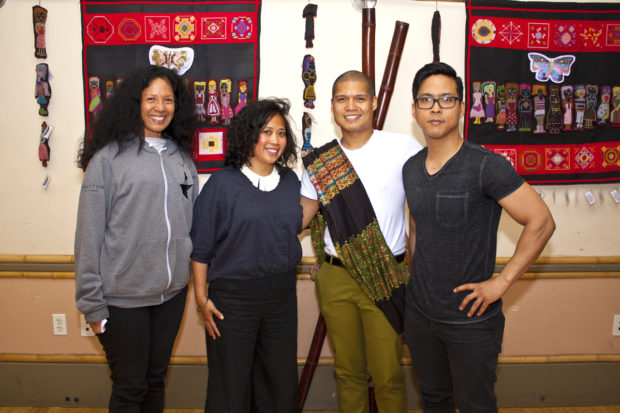
Innovating Artists panelists (left-to-right) Caroline Cabading, Irene Duller, Don Aguillo and Raf Salazar. INQUIRER/Wilfred Galila
SAN FRANCISCO – This year’s edition (the third) of the annual Dialogue in the Diaspora featured a benefit performance, dialogues, a kamayan dinner with performances, and workshops on June 15, 16, and 17 at the Bayanihan Community Center at the heart of SOMA: Pilipinas, the Filipino Cultural Heritage District.
Kularts, the premiere presenter of contemporary and tribal Filipino art in the U.S., hosted the event. “Oftentimes we get caught up with just doing. Sitting down and talking is one thing that we usually don’t allow ourselves to have,” says Kularts’ executive and artistic director,
Alleluia Panis. “It’s a safe space to talk about and have a pointed conversation. It’s really important for the growth of our community.”
The three-day event was kicked off by a benefit performance of Rosalie Zerrudo’s theatrical piece, PDL 700%,on Friday, June 15.
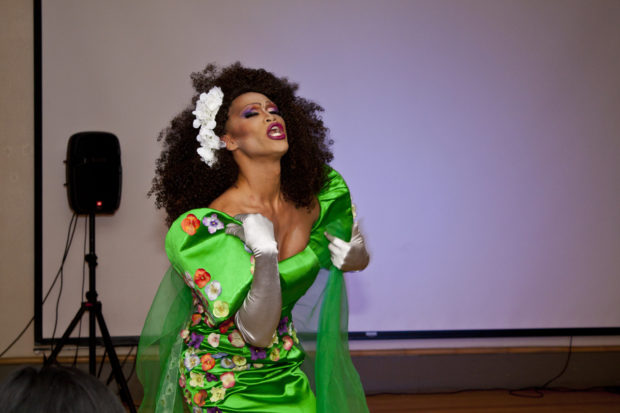
BreeAhna Brian Batugo performs at the Kamayan Kabaret. INQUIRER/Wilfred Galila.
Zerrudo, an artist, cultural worker, and professor at the University of San Agustin in Iloilo City, Philippines, created her piece inspired by real-life stories of women inmates at the Iloilo City District Jail Female Dorm.
She was able to gain access to the women and their stories through her work in creating and establishing Hilway Art Products, made by and for the benefit of the women inmates of the city jail. The highlights of the art products are the Inday Dolls, iconic soft sculptures that bear the narratives of the women in prison. The dolls and other items from Hilway Art Productswere also exhibited for sale at the venue.
Alleluia Panis directed the iteration of PDL 700%with live original music by Bay Area based musicians Aimee Amparo and Joshua Icban.
Proceeds from the performance and sales of products will go to Hilway Art Productsand the women inmates of Iloilo City District Jail.
Zerrudo’s performance was followed by a reading by writer Melissa R. Sipin who shared an essay about her family’s history of trauma and oppression through the harrowing experience of her grandmother as a comfort woman during the Second World War in the Philippines. A panel discussion with Zerrudo and Sipin about historical, familial, and current issues concerning Filipino women in the diaspora capped the night.
The dialogues on the afternoon of June 16 comprised three varied and rich panel discussions comprised.
The Institutional Engagement panel was moderated by educator, programmer, writer, and community organizer, PJ Policarpio, with curator and community engagement organizer, Lian Ladia; entrepreneur, events enthusiast, efficiency nerd, and non-profit advocate, Gina Mariko Rosales; and performance and multi-media poet artist, cultural worker, community-teaching artist, and professor, Rosalie Zerrudo as panelists.
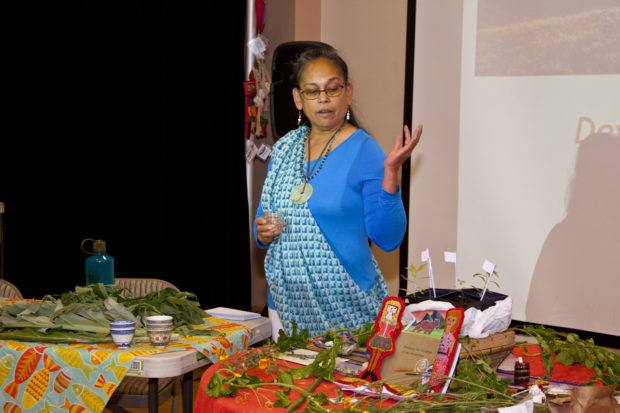
Holly Calica conducts the Introduction to Plant Medicine workshop. INQUIRER/Wilfred Galila
The panel on Innovative Artists and Cultural Workers was comprised of artist and professor, Irene Duller; artist and illustrator, Raf Salazar; vocalist, traditional Philippine percussionist, traditional arts educator and musical director, and filmmaker, Caroline Cabading; and freelance illustrator, graphic designer, concept artist, teacher, martial arts instructor, and folkloric dancer, Don Aguillo; and moderated by artist and Kularts’ program manager Kimberly Arteche.
Panis emphasizes the responsibility of artists and cultural workers in relation to the work that they do: “How do artists take a very compelling experience and create a piece of art without co-opting, without being disrespectful and doing it honorably? It’s not to appropriate and sensationalize it; to take community stories or peoples stories, create art with it and do it in such a way that honors and respects that experience.”
The panel on the State of LGBT+ artists was comprised of educator, interpreter, counselor and community artist, Rani Marcos; Filipino folk dancer, Jae Tioseco; dancer, Jose Abad; and was moderated by visual and performance artist and designer, Aimee Espiritu.
According to Panis, a specific panel for LGBT+ artists for this year’s dialogue was included because it was needed—the necessity of discussions about queer perspectives and aesthetics as it applies to Filipino art and identity.
“There are so many queer people in our community. Part of the idea of having that particular panel is that we don’t necessarily hear from LGBTQ folks in our community how they feel about whatever is going on,” says Panis. “Maybe the discussion happens somewhere else but certainly, within the circle of people of Kularts and SOMA Pilipinas, those things are not talked about necessarily.”
Panis confronts and explores possible solutions to issues about space, inclusion, and awareness within the Filipino arts community.
“I’m interested in seeing how we can be more open and aware,” says Panis. “The sensitivity on how to be inclusive in our dialogues, in our spaces, and really be clear that there’s definitely a queer culture.”
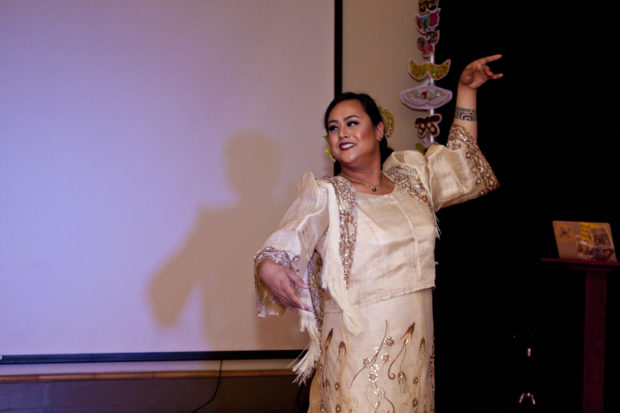
Jae Tioseco dances the Malagueña de Catanauan. INQUIRER/Wilfred Galila.jpg
Furthermore, with regards to the various intersections of Filipino identity and creativity, Panis ruminates, “Are our queer artists going to some other place to exercise their queer creativity and go to Filipino spaces to exercise their Filipino creativity?” She poses a question to arrive at possible solutions, “How can we, as an arts organization and institution, provide a space that will allow substantial members of our community to create something that’s both? We’re exploring that.”
Saturday night was the Kamayan Kabaret, a cabaret kamayan(by hand/to eat with hands) dinner with delicious staples of Filipino cuisine laid out on banana leaf covered tables for a communal feast, featuring entertaining and provocative performances by a variety of Filipino artists.
Kinbaku Love, a performing arts duo practicing Japanese rope bondage (kinbaku/shibari), generated and released some tension with their performance.
Brian Batugo, teacher, arts director, and performer, brought the house down as his drag alter ego BreeAhna of the Rice Rockettes.
Actor, dancer, and performance artist Earl Paus utilized audience participation with his scantily clad provocative and interactive performance piece infused with poetry.
Filipino folk dancer Jae Tioseco gave an elegant rendition of the Malagueña de Catanauan, a dance based on the Malagueñabrought by the Spaniards to the Philippines. Tioseco’s rendition is a version of the dance from Catanauan, Quezon Province that incorporates indigenous movement reminiscent of the flapping wings of birds.
Maiana Minahal, poet, artist, professor, and co-founder of the queer Pin@y artist group, Kreatibo, performed her genre-smashing, identity-bending, and thought provoking poetry performance piece musically and visually scored by a video of a performance of the Philippine dance Singkil.
Dancer and costume designer, June Arellano, was the Madame of Ceremonies and musical entertainment throughout the evening was provided by musicians Aimee Amparo and Joshua Icban.
This year’s event came to a close on June 17 with introductory workshops on various arts and disciplines, including those that involve sexuality. These are practices that, for the most part, are still outside of the boundaries of most members of the Filipino community yet very much existing within the culture and the community.
“It’s about pushing boundaries. The exploration that Kularts does is really looking at alternative ways of functioning or creating work—where can we go outside of the box? To learn about these things in a safe space without being crass or disrespectful,” says Panis.
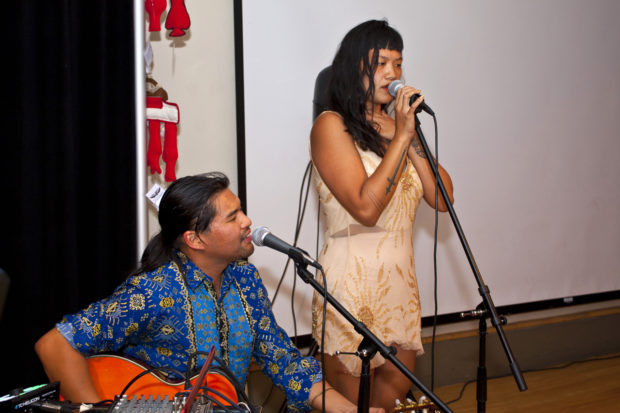
Joshua Icban and Aimee Amparo. INQUIRER/Wilfred-Galila
This year’s Workshop Samplers were Introduction to Plant Medicines with herbalist, Holly Calica; Introduction to Drag with artist and drag performer, Brian Batugo; Introduction to Shibari with Kinbaku Love; and Introduction to Romantic and Sensual Tagalog with Lydia Neff.
“Its about how do we create spaces to discuss whatever is important within the Filipino community,” says Panis. “And, because we are an arts organization, it has to be through the artistic lens.”
Panis summed up the intention and the aspiration about the importance of dialogues within the Filipino community.
“There are a lot of conversations that come through out of the dialogues as to where the culture is going, what is being created, who we are, who are we becoming, what are the obstacles and challenges, and what are the opportunities. Those are the overarching rationale for the conversation. What we hope for is a deeper dive into these things.”
www.kularts-sf.org

